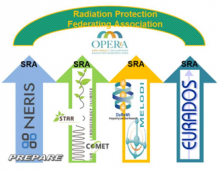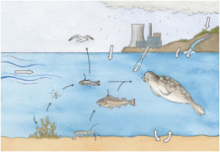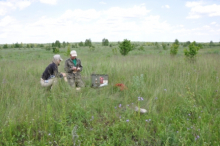The COMET project finished in 2017 the only page which continues to be upadated is the COMET project publication list.
This is your gateway to accessing the outputs of the COMET project.
- COMET Members
- COMET - FRAME
- COMET - RATE
- Newsletters
- Knowledge Exchange
- Challenges in chronic low dose effects and risk assessment
- Improving and validating radioecology models
- Joint programming and Implemenation - Expanding Alliance
- COMET Final event
The COMET (COordination and iMplementation of a pan-Europe instrumenT for radioecology) project is funded by the EU as part of the 7th Framework programme until 2017; It had, at the time of the COMET launch, 13 consortium partners from 11 countries. After and external call, FRAME and RATE joined COMET. COMET now has 20 partners from 15 countries. COMET will develop strong mechanisms for knowledge exchange and dissemination to enhance and maintain European capacity, competence and skills in radioecology. The consortium aims to improve and integrate research on the impact of radiation on man and the human food chain and on environment, particularly the protection of wildlife. They hope to achieve this by identifying, quantifying and evaluating the:
- exposure to environmental radioactivity of humans and other organisms
- potential biological effects and associated risks to wildlife for a wide range of environmental situations
- effectiveness of mitigating measures suitable for responding to nuclear accidents and other contaminating events.
WORK WILL BE CONDUCTED UNDER THE FOUR TOPIC AREAS DESCRIBED BELOW:
1. JOINT PROGRAMMING AND IMPLEMENTATION - EXPANDING THE ALLIANCEThis task will continue the work performed by the STAR NoE and European Radioecology Alliance (ALLIANCE) to strengthen research on the impact of radiation on man and the environment; it will: | |
The relationship of the COMET project to other projects and networks. | PROMOTE INTEGRATION: DEVELOP MECHANISMS FOR JOINT PROGRAMMING: STRENGTHEN CAPACITY AND COMPETENCE IN RADIOECOLOGY: |
2. IMPROVING AND VALIDATING RADIOECOLOGY MODELSTasks conducted in this topic area will strengthen pan-European links between the radioecology and the emergency and post-accident communities. Consortium partners will undertake joint research activities to improve and validate radioecological models in order to better protect humans and the environment following existing, planned and emergency exposure situations. The consortium partners involved will: | |
The movement of radionucides in the marine environment. | IMPROVE RADIOECOLOGY MODELS: CONDUCT INNOVATIVE RESEARCH: RESEARCH RESULTS: |
3. CHALLENGES IN CHRONIC LOW DOSE EFFECTS AND RISK ASSESSMENTThe aim of work in this topic area is to improve knowledge on the effects of low doses of radiation, it will achieve this by: | |
Picture copyright © JM Bonzom-IRSN | IMPLEMENTING INNOVATIVE RESEARCH: STRENGTHENING THE RESEARCH COMMUNITY: PROMOTE INTEGRATION: |
4. KNOWLEDGE EXCHANGEThe overarching objective of this work package is to enhance and maintain European capacity and skills in radioecology by establishing a dynamic interaction promoting effective collaboration between researchers, tool developers, regulators and industry; it will achieve this by: | |
Picture copyright © CEH | PROVIDING INFORMED AND REGULAR UPDATES OF PROJECT DEVELOPMENTS: DEBATING TOPICAL RADIATION PROTECTION ISSUES: MAINTAINING AND ENHANCING COMPETENCE: By focusing on the training needs of the user community and the best way interact with other on-going training activities Conducting field study courses in collaboration with STAR NoE which will be open to PhD students and professionals |



